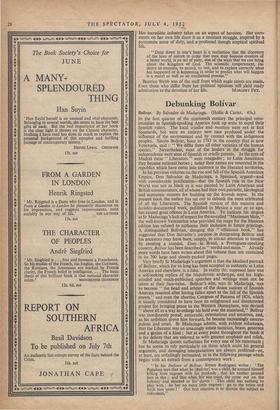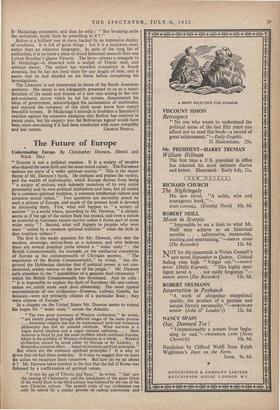Debunking Bolivar
Bolivar. By Salvador de Madariaga. (Hollis & Carter. 45s.) IN the first quarter of the nineteenth century the principal coin. imunities in Spanish-speaking America took up arms to expel their/ Spanish rulers. The local criollos and mestizos were not in fact Spaniards, but were an embryo new race produced under the influence of the environment and by contact with the indigenous peoples. Simon Bolivar, born in 1783 in the country that is now Venezuela, said : " We differ from all other varieties of the human species." Nevertheless, most of the leaders in the struggle for independence were Sons of Spanish or criollo parents. In the eyes of Madrid these " Liberators " were renegades ; to Latin Americans they became national heroes ; today their names are venerated in the republics which have come into existence in the liberated territories. In his previous volumes on the rise and fall of the Spanish American Empire, Don Salvador de Madariaga, a Spaniard, argued—and with considerable justification—that the Spanish rule in the New' World was not as black as it was painted by Latin American and British commentators, all of whom had their own patriotic, ideological and economic reasons for building up the leyenda negra. In the present book the author has set out to debunk the most celebrated of all the Liberators. The Spanish version of this massive and lavishly-documented work, published in Mexico a year or so ago, has caused great offence in Latin America. To indicate his disgust at Sr Madariaga's lack of respect for the so-called " Maximum Male," the well-known Venezuelan who provided the maps for the Mexican edition has refused to authorise their inclusion in future printings. A distinguished Bolivian, slanging this " villainous book," has suggested that Don Salvador's purpose in denigrating Bolivar and his ancestors may have been, simply, to attract attention to himself by creating a scandal. Even in Brazil,a Portuguese-speaking country, Bolivar has been described as " sordid and mean." Already more words have been writen about this volume than are contained in its 700 large and closely-packed pages. Very briefly Sr Madariaga's argument is that the idealised portrait of Bolivar, which for so long has been accepted as authentic in Latin America and elsewhere, is a fake. In reality this supposed hero was a self-seeking replica of the Napoleonic archetype, and his high- minded and much-publicised speeches and writings must not be taken at their face-value. Bolivar's aim, says Sr Madariaga, was to become " the head and arbiter of the dozen nations of Spanish America reunited after having fallen apart at the fall of the Spanish crown," and even the abortive Congress of Panama of 1826, which is usually considered to have been an enlightened and disinterested project for bringing peace to the Western Hemisphere, was devised above all as a way to enlarge his hold over the mainland," Bolivar was inordinately proud, autocratic, ostentatious and amorous, and, as his ambition drove him forward, he became increasingly unscru- pulous and cruel. Sr Madariaga admits, with evident reluctance, that the Liberator was an amazingly astute tactician, brave, generous and a genius of a kind ; but at every point throughout the book it is his defects that are referred to with greatest emphasis and relish. Sr Madariaga quotes authorities for every one of his statements ; but he seems to rely particularly on those which assist his general argument, and damaging interpretations are always preferred—or, at least, arc unfailingly insinuated, as in the following passage which begins with an extract from a contemporary work : " In his Defence of Bolivar, Simon Rodriguez writes : The Populace says that when he [Bolivar] was a child, he amused himself killing little negroes with his penknife ; that his mother pleased him in this ; and that when her son cried, she came out on the balcony and shouted to her slaves : This child has nothing to play with ; he has no more little negroes : go to the estate and fetch him some l ' Our first reaction is to dismiss the subject as ridiculous,"
Sr Madariaga comments, and then he adds : " But brushing aside the caricature, could there be something in it ? "
Bolivar is a brilliant tour de force, backed by an impressive display of erudition. It is full of good things ; but it is a malicious essay rather than an objective biography. In spite of the long list of authorities, it is no more a piece of sound historical research than was Lytton Strachey's Queen Victoria. The hero—always a renegade to Sr Madariaga—is dissected with a scalpel of Toledo steel, and without mercy. The author has travelled extensively in South America, but he has not lived there for any length of time, and it seems that he had decided on his thesis before completing his investigations. The Liberator is not interpreted in terms of the South American ambiente. His career is not adequately presented to us as a mani- festation of the needs and dreams of a new race arising in the vast sub-continent, across which he led his armies, disseminated his ideas of government, acknowledged the acclamation of multitudes, and enjoyed the company of (we shall never know how many) beautiful women. Sr Madariaga's attitude is doubtless a Spaniard's reaction against the excessive adulation that Bolivar has received in recent years, but his enquiry into the Bavarian legend would have been more convincing if it had been conducted with more sympathy



























































 Previous page
Previous page